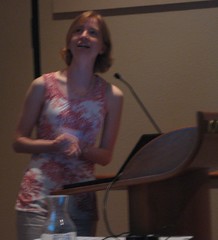 |
I’m at a I’m at a video games conference in Madison, Wisconsin. Having woken up in Vermont, I was unable to get here for James Gee’s opening keynote, nor the first session. However, after arriving, I found a seat in the very front of a session on the politics of cheating — the only seat left in the conference.
It was an intriguing panel presentation of folks (mostly very young researchers — non looked older than 17) who have conducted various research on the phenomena of cheating in video games. What resonated most with me was a section in Mia Consalvo’sDeborah Fields look at cheat sites, web sites created by players to consolodate cheats and cheat strategies. She was looking at the online game, Whyville, so the sites that she examined were mostly set up by 13 and 14 year olds. It seems that what these kids do, to collaboratively produce an information document (web site) to help people accomplish something, involves exactly the sorts of information skills we want them to develop.
Now they are developing their site to cheat, but Scot Osterweil asked a question at the end of the session (pre-empting the question I wanted to ask) that I think cut through to what was swirling under the surface of my mind. Are we talking about cheating? or are we talking about a lot of other things, that perhaps need other names? One of the researchers indicated that even the kids, the subjects of their research seemed to have difficulty working around the word cheating.
Much of it is resourcefulness and changing the rules. My question was going to be, “How do teachers restructure their assignments so that they invite this kind of resourcefulness?”
Perhaps an answer will reveal itself as the conference progresses.

An interesting question, and one that will get much discussion in the near future I believe. “Cheat codes” are really nothing more than “shortcuts” in my opinion (I am not a gamer, by the way). We teach our kids shortcuts all the time. The collaboration and sharing these kids do to help one another succeed is incredible. If we could instill the same excitement and enthusiasm in getting their friends to succeed in math or science or (my favorite) sentence diagramming, what would be the learning outcomes?
There was a recent discussion at Hal Davidson’s blog for Discovery about the removal of iPods from some schools because students were using them to cheat on tests. In that discussion, we also looked at all the learning that went on while kids were manipulating information from paper to text files to iPods and the number of times they had to look at and process the information. Is that really cheating? I’m not so sure any more.
Great question. Every potential needs to be practiced in order to be developed. Students with that kind of potential will certainly make a difference if implemented the right way.
What’s interesting about this (from the context of my day job in HE) is looking at this as an indication of the experience and support and learning styles this age group will expect by the time they arrive at university in four or five years. we haven’t got long to start planning!
It would be great if those students were given the chance to develop their skills in schools. It’s sad that some teachers don’t apply this kind of strategy for their students.